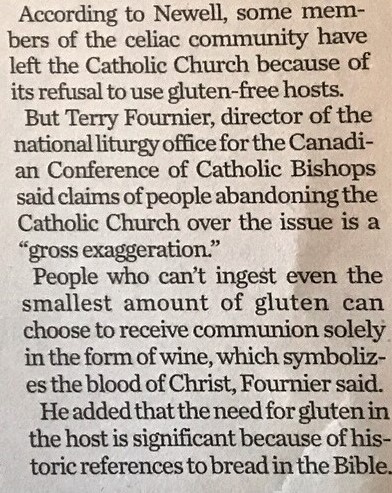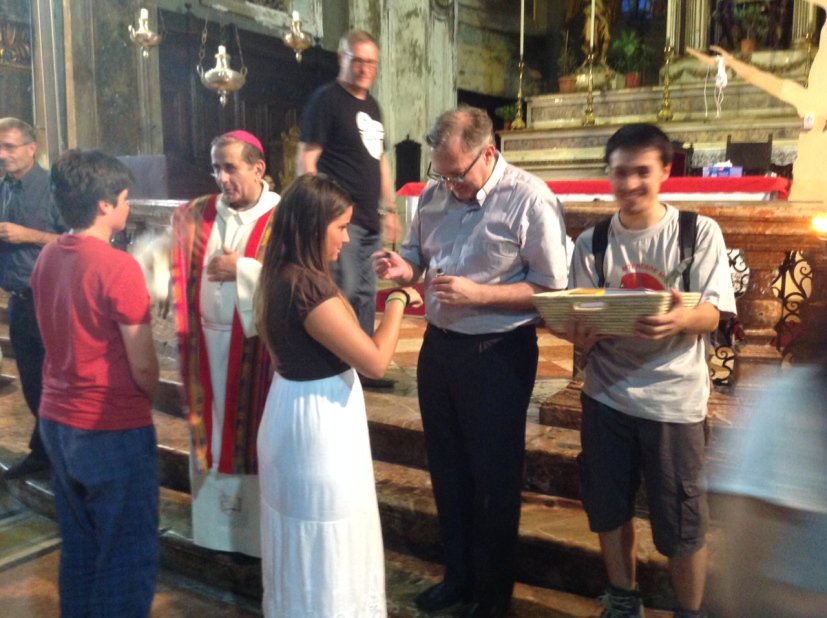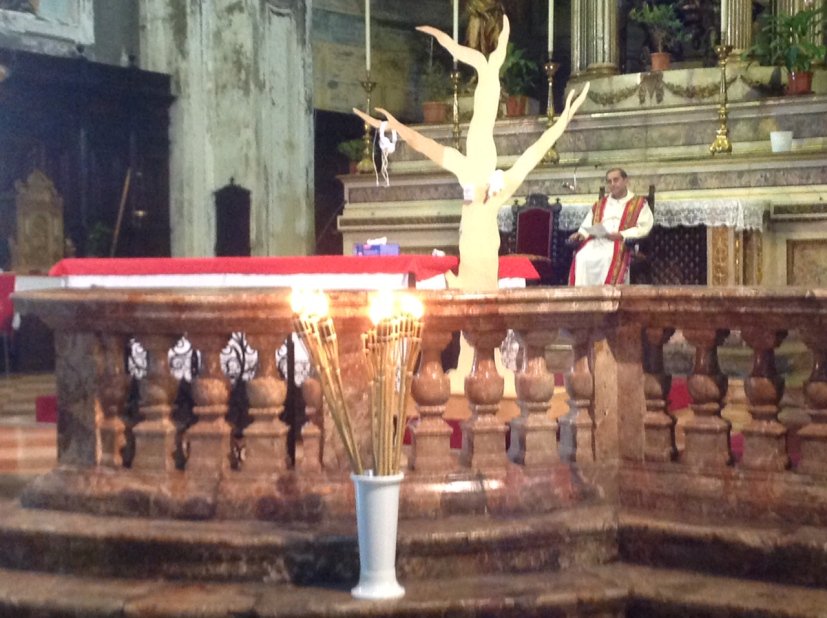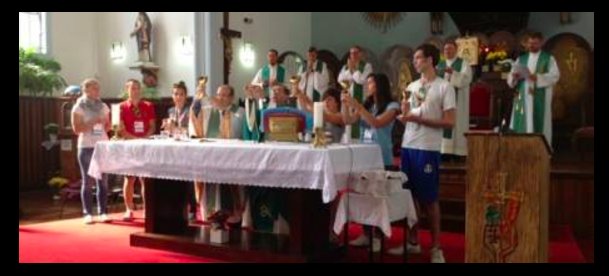The gross insult to faithful, American (and many Canadians by extension) Catholics by Tony Spadaro is below. If one says that the Bishop of Rome did not know about it he surely does now.
In this screed, he also targets Michael Voris and the folks at ChurchMilitant. By extension, this Jesuit attacks individual Catholics, including those of us who blog and think along the same lines as Michael Voris which to me, is to think with the Church. The Church of my childhood, the Church of my parents, the Church of my Maronite ancestors.
We did not ask for this. We were living in peace until that March in 2013. We have continued, in spite of the insults, degradation and heretical statements of the Bishop of Rome to continue to remain loyal to the Our Lord Jesus Christ and His Church and the Rock of Peter and to do the work necessary and to which we have been called. In my case, it is the weekly chanting of the true and proper Mass in a community two hours from my home. A community growing, with many children, with an organist now ready to go on to Catholic college and her 12 year old sister preparing to take over playing 14 Gregorian Masses, five Creeds and more. My work continues in Toronto with the assistance and training for the proper and true Roman Mass. I will not be stopped. You must not be stopped.
This screed is a disgrace but it must be seen by all of us as a badge of honour.
Never, did I think, I would live to be insulted by the Bishop of Rome.
Rejouissance!
Evangelical
Fundamentalism and Catholic Integralism in the USA: A surprising ecumenism
Antonio Spadaro S.J., Editor-in-chief of La Civiltà
Cattolica
Marcelo Figueroa, Presbyterian pastor, Editor-in-chief of
the Argentinean edition of L’Osservatore Romano
In God We Trust. This phrase is printed on the banknotes of
the United States of America and is the current national motto. It appeared for
the first time on a coin in 1864 but did not become official until Congress
passed a motion in 1956. A motto is important for a nation whose foundation was
rooted in religious motivations. For many it is a simple declaration of faith.
For others, it is the synthesis of a problematic fusion between religion and
state, faith and politics, religious values and economy.
Religion, political Manichaeism and a cult of the apocalypse
Religion has had a more incisive role in electoral processes
and government decisions over recent decades, especially in some US
governments. It offers a moral role for identifying what is good and what is
bad.
At times this mingling of politics, morals and religion has
taken on a Manichaean language that divides reality between absolute Good and
absolute Evil. In fact, after President George W. Bush spoke in his day about
challenging the “axis of evil” and stated it was the USA’s duty to “free the
world from evil” following the events of September 11, 2001. Today President Trump steers the fight
against a wider, generic collective entity of the “bad” or even the “very bad.”
Sometimes the tones used by his supporters in some campaigns take on meanings
that we could define as “epic.”
These stances are based on Christian-Evangelical
fundamentalist principles dating from the beginning of the 20th Century that
have been gradually radicalized. These have moved on from a rejection of all
that is mundane – as politics was considered – to bringing a strong and
determined religious-moral influence to bear on democratic processes and their
results.
The term “evangelical fundamentalist” can today be
assimilated to the “evangelical right” or “theoconservatism” and has its
origins in the years 1910-1915. In that period a South Californian millionaire,
Lyman Stewart, published the 12-volume work The Fundamentals. The author wanted
to respond to the threat of modernist ideas of the time. He summarized the
thought of authors whose doctrinal support he appreciated. He exemplified the
moral, social, collective and individual aspects of the evangelical faith. His
admirers include many politicians and even two recent presidents: Ronald Reagan
and George W. Bush.
The social-religious groups inspired by authors such as
Stewart consider the United States to be a nation blessed by God. And they do
not hesitate to base the economic growth of the country on a literal adherence
to the Bible. Over more recent years this current of thought has been fed by
the stigmatization of enemies who are often “demonized.”
The panorama of threats to their understanding of the
American way of life have included modernist spirits, the black civil rights
movement, the hippy movement, communism, feminist movements and so on. And now
in our day there are the migrants and the Muslims. To maintain conflict levels,
their biblical exegeses have evolved toward a decontextualized reading of the
Old Testament texts about the conquering and defense of the “promised land,”
rather than be guided by the incisive look, full of love, of Jesus in the
Gospels.
Within this narrative, whatever pushes toward conflict is
not off limits. It does not take into account the bond between capital and
profits and arms sales. Quite the opposite, often war itself is assimilated to
the heroic conquests of the “Lord of Hosts” of Gideon and David. In this
Manichaean vision, belligerence can acquire a theological justification and
there are pastors who seek a biblical foundation for it, using the scriptural
texts out of context.
Another interesting aspect is the relationship with creation
of these religious groups that are composed mainly of whites from the deep
American South. There is a sort of “anesthetic” with regard to ecological
disasters and problems generated by climate change. They profess “dominionism”
and consider ecologists as people who are against the Christian faith. They
place their own roots in a literalist understanding of the creation narratives
of the book of Genesis that put humanity in a position of “dominion” over
creation, while creation remains subject to human will in biblical submission.
In this theological vision, natural disasters, dramatic
climate change and the global ecological crisis are not only not perceived as
an alarm that should lead them to reconsider their dogmas, but they are seen as
the complete opposite: signs that confirm their non-allegorical understanding
of the final figures of the Book of Revelation and their apocalyptic hope in a
“new heaven and a new earth.”
Theirs is a prophetic formula: fight the threats to American
Christian values and prepare for the imminent justice of an Armageddon, a final
showdown between Good and Evil, between God and Satan. In this sense, every
process (be it of peace, dialogue, etc.) collapses before the needs of the end,
the final battle against the enemy. And the community of believers (faith)
becomes a community of combatants (fight). Such a unidirectional reading of the
biblical texts can anesthetize consciences or actively support the most
atrocious and dramatic portrayals of a world that is living beyond the
frontiers of its own “promised land.”
Pastor Rousas John Rushdoony (1916-2001) is the father of
so-called “Christian reconstructionism” (or “dominionist theology”) that had a
great influence on the theopolitical vision of Christian fundamentalism. This
is the doctrine that feeds political organizations and networks such as the
Council for National Policy and the thoughts of their exponents such as Steve
Bannon, currently chief strategist at the White House and supporter of an
apocalyptic geopolitics.[1]
“The first thing we have to do is give a voice to our
Churches,” some say. The real meaning of this type of expression is the desire
for some influence in the political and parliamentary sphere and in the
juridical and educational areas so that public norms can be subjected to
religious morals.
Rushdoony’s doctrine maintains a theocratic necessity:
submit the state to the Bible with a logic that is no different from the one
that inspires Islamic fundamentalism. At heart, the narrative of terror shapes
the world-views of jihadists and the new crusaders and is imbibed from wells
that are not too far apart. We must not forget that the theopolitics spread by
Isis is based on the same cult of an apocalypse that needs to be brought about
as soon as possible. So, it is not just accidental that George W. Bush was seen
as a “great crusader” by Osama bin Laden.
Theology of prosperity and the rhetoric of religious liberty
Together with political Manichaeism, another relevant
phenomenon is the passage from original puritan pietism, as expressed in Max
Weber’s The Protestant Ethic and the Spirit of Capitalism, to the “Theology of
Prosperity” that is mainly proposed in the media and by millionaire pastors and
missionary organizations with strong religious, social and political influence.
They proclaim a “Prosperity Gospel” for they believe God desires his followers
to be physically healthy, materially rich and personally happy.
It is easy to note how some messages of the electoral
campaign and their semiotics are full of references to evangelical
fundamentalism. For example, we see political leaders appearing triumphant with
a Bible in their hands.
Pastor Norman Vincent Peale (1898-1993) is an important
figure who inspired US Presidents such as Richard Nixon, Ronald Reagan and
Donald Trump. He officiated at the first wedding of the current president and
the funeral of his parents. He was a successful preacher. He sold millions of
copies of his book The Power of Positive Thinking (1952) that is full of
phrases such as “If you believe in something, you get it”, “Nothing will stop
you if you keep repeating: God is with me, who is against me” or “Keep in mind
your vision of success and success will come” and so on. Many prosperity
prosperous televangelists mix marketing, strategic direction and preaching,
concentrating more on personal success than on salvation or eternal life.
A third element, together with Manichaeism and the prosperity
gospel, is a particular form of proclamation of the defense of “religious
liberty.” The erosion of religious liberty is clearly a grave threat within a
spreading secularism. But we must avoid its defense coming in the
fundamentalist terms of a “religion in total freedom,” perceived as a direct
virtual challenge to the secularity of the state.
Fundamentalist ecumenism
Appealing to the values of fundamentalism, a strange form of
surprising ecumenism is developing between Evangelical fundamentalists and Catholic
Integralists brought together by the same desire for religious influence in the
political sphere.
Some who profess themselves to be Catholic express
themselves in ways that until recently were unknown in their tradition and
using tones much closer to Evangelicals. They are defined as value voters as
far as attracting electoral mass support is concerned. There is a well-defined
world of ecumenical convergence between sectors that are paradoxically
competitors when it comes to confessional belonging. This meeting over shared
objectives happens around such themes as abortion, same-sex marriage, religious
education in schools and other matters generally considered moral or tied to
values. Both Evangelical and Catholic Integralists condemn traditional ecumenism
and yet promote an ecumenism of conflict that unites them in the nostalgic
dream of a theocratic type of state.
However, the most dangerous prospect for this strange
ecumenism is attributable to its xenophobic and Islamophobic vision that wants
walls and purifying deportations. The word “ecumenism” transforms into a
paradox, into an “ecumenism of hate.” Intolerance is a celestial mark of
purism. Reductionism is the exegetical methodology. Ultra-literalism is its
hermeneutical key.
Clearly there is an enormous difference between these
concepts and the ecumenism employed by Pope Francis with various Christian
bodies and other religious confessions. His is an ecumenism that moves under
the urge of inclusion, peace, encounter and bridges. This presence of opposing
ecumenisms – and their contrasting perceptions of the faith and visions of the
world where religions have irreconcilable roles – is perhaps the least known
and most dramatic aspect of the spread of Integralist fundamentalism. Here we
can understand why the pontiff is so committed to working against “walls” and
any kind of “war of religion.”
The temptation of “spiritual war”
The religious element should never be confused with the
political one. Confusing spiritual power with temporal power means subjecting
one to the other. An evident aspect of Pope Francis’ geopolitics rests in not
giving theological room to the power to impose oneself or to find an internal
or external enemy to fight. There is a need to flee the temptation to project
divinity on political power that then uses it for its own ends. Francis empties
from within the narrative of sectarian millenarianism and dominionism that is
preparing the apocalypse and the “final clash.”[2] Underlining mercy as a
fundamental attribute of God expresses this radically Christian need.
Francis wants to break the organic link between culture,
politics, institution and Church. Spirituality cannot tie itself to governments
or military pacts for it is at the service of all men and women. Religions
cannot consider some people as sworn enemies nor others as eternal friends.
Religion should not become the guarantor of the dominant classes. Yet it is
this very dynamic with a spurious theological flavor that tries to impose its
own law and logic in the political sphere.
There is a shocking rhetoric used, for example, by the
writers of Church Militant, a successful US-based digital platform that is
openly in favor of a political ultraconservatism and uses Christian symbols to
impose itself. This abuse is called “authentic Christianity.” And to show its
own preferences, it has created a close analogy between Donald Trump and
Emperor Constantine, and between Hilary Clinton and Diocletian. The American
elections in this perspective were seen as a “spiritual war.”[3]
This warlike and militant approach seems most attractive and
evocative to a certain public, especially given that the victory of Constantine
– it was presumed impossible for him to beat Maxentius and the Roman
establishment – had to be attributed to a divine intervention: in hoc signo
vinces.
Church Militant asks if Trump’s victory can be attributed to
the prayers of Americans. The response suggested is affirmative. The indirect
missioning for President Trump is clear: he has to follow through on the
consequences. This is a very direct message that then wants to condition the
presidency by framing it as a divine election. In hoc signo vinces. Indeed.
Today, more than ever, power needs to be removed from its
faded confessional dress, from its armor, its rusty breastplate. The
fundamentalist theopolitical plan is to set up a kingdom of the divinity here
and now. And that divinity is obviously the projection of the power that has
been built. This vision generates the ideology of conquest.
The theopolitical plan that is truly Christian would be
eschatological, that is it applies to the future and orients current history
toward the Kingdom of God, a kingdom of justice and peace. This vision
generates a process of integration that unfolds with a diplomacy that crowns no
one as a “man of Providence.”
And this is why the diplomacy of the Holy See wants to
establish direct and fluid relations with the superpowers, without entering
into pre-constituted networks of alliances and influence. In this sphere, the
pope does not want to say who is right or who is wrong for he knows that at the
root of conflicts there is always a fight for power. So, there is no need to
imagine a taking of sides for moral reasons, much worse for spiritual ones.
Francis radically rejects the idea of activating a Kingdom
of God on earth as was at the basis of the Holy Roman Empire and similar
political and institutional forms, including at the level of a “party.”
Understood this way, the “elected people” would enter a complicated political
and religious web that would make them forget they are at the service of the
world, placing them in opposition to those who are different, those who do not
belong, that is the “enemy.”
So, then the Christian roots of a people are never to be
understood in an ethnic way. The notions of roots and identity do not have the
same content for a Catholic as for a neo-Pagan. Triumphalist, arrogant and
vindictive ethnicism is actually the opposite of Christianity. The pope on May
9 in an interview with the French dailyLa Croix, said: “Yes Europe has
Christian roots. Christianity has the duty of watering them, but in a spirit of
service as in the washing of feet. The duty of Christianity for Europe is that
of service.” And again: “The contribution of Christianity to a culture is that
of Christ washing the feet, or the service and the gift of life. There is no
room for colonialism.”
Against fear
Which feeling underlies the persuasive temptation for a
spurious alliance between politics and religious fundamentalism? It is fear of
the breakup of a constructed order and the fear of chaos. Indeed, it functions
that way thanks to the chaos perceived. The political strategy for success
becomes that of raising the tones of the conflictual, exaggerating disorder,
agitating the souls of the people by painting worrying scenarios beyond any
realism.
Religion at this point becomes a guarantor of order and a
political part would incarnate its needs. The appeal to the apocalypse
justifies the power desired by a god or colluded in with a god. And fundamentalism
thereby shows itself not to be the product of a religious experience but a poor
and abusive perversion of it.
This is why Francis is carrying forward a systematic
counter-narration with respect to the narrative of fear. There is a need to
fight against the manipulation of this season of anxiety and insecurity. Again,
Francis is courageous here and gives no theological-political legitimacy to
terrorists, avoiding any reduction of Islam to Islamic terrorism. Nor does he
give it to those who postulate and want a “holy war” or to build barrier-fences
crowned with barbed wire. The only crown that counts for the Christian is the
one with thorns that Christ wore on high.[4]
FOOTNOTES
[1] Bannon believes in the apocalyptic vision that William
Strauss and Neil Howe theorized in their book The Fourth Turning: What Cycles
of History Tell Us About America’s Next Rendezvous with Destiny. See also N.
Howe, “Where did Steve Bannon get his worldview? From my book”, in The
Washington Post, February 24, 2017.
[2] See A. Aresu, “Pope Francis against the Apocalypse”, in
Macrogeo(www.macrogeo.global/analysis/pope-francis-against-the-apocalypse),
June 9, 2017.
[3] See “Donald ‘Constantine’ Trump? Could Heaven be
intervening directly in the election?”, in Church Militant (www.churchmilitant.com/video/episode/vortex-donald-constantine-trump).
[4] For further reflection see D. J. Fares, “L’antropologia
politica di Papa Francesco», in Civ. Catt. 2014 I 345-360; A. Spadaro, “La
diplomazia di Francesco. La misericordia come processo politico”, ib 2016 I
209-226; D. J. Fares, “Papa Francesco e la politica”, ib 2016 I 373-385; J. L.
Narvaja, “La crisi di ogni politica cristiana. Erich Przywara e l’‘idea di
Europa’”, ib 2016 I 437-448; Id., “Il significato della politica internazionale
di Francesco”, ib 2017 III 8-15.











